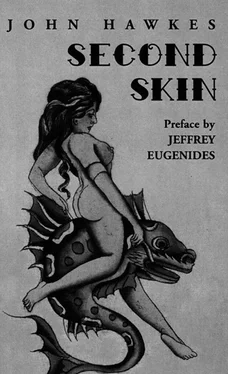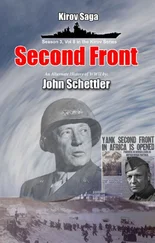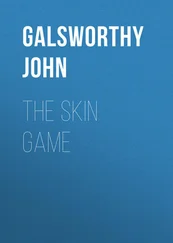“I thought you were going to wear slacks, Cassandra,” I said. “Slacks are more appropriate to a boat, you know. Much more appropriate than a full skirt, Cassandra. But of course it’s too late now anyway.”
We went downstairs together — shadows and little playful drafts on the stairs, and if it wasn’t a big prize bow for a high school dance then it was a big billowing rust-colored skirt for a windy day — and in the kitchen she hugged Miranda and kissed Pixie’s forehead. Then hot coffee, standing up, and then another hug, another kiss, and then good-by.
“While we’re gone, Miranda,” I said, “don’t fool around with the nipples or do anything harmful to the child. OK, Miranda?”
“My God, Skip, you’ve got a sore memory, haven’t you? But everything’s forgiven, Skip. Don’t worry.”
The wind, the red sun, and I tried to take her arm under the chestnut tree, but she walked on ahead of me with the kerchief tilted back and her two small white hands pressed down flat against the tiny round abdomen of the orange skirt which lunged and kicked and whirled in woolen fury. The hard thin mature white legs were bare, I could see that, and I tried to come abreast of her again on the empty road.
“That skirt’s going to give you trouble, Cassandra,” I said, just as all at once she turned off the road and began to run lightly down the weedy path with the skirt whipping and fumbling about her legs and the tight kerchief changing color in the dawn light.
“Wait, Cassandra, wait for me,” I called. I wondered what figure of unhappiness it was that I could see plainly enough in the stiffness of the slender shoulders and forlorn abandonment of the little swathed head. Her feet were describing those sad uncomfortable circles of the young female who runs off with wet eyes or uncommunicative smile or tiny cry clutched, held, in the naked throat, and I wanted to stop her, wanted to walk awhile with my arm about her shoulder and her hand in my hand. But it was no use.
“Jomo, good morning,” I heard her say in her best voice, and I saw it all, Cassandra still lightly running and Jomo looking at her from where he was crouched at the gasoline pump and Red watching her from the bow of the Peter Poor and Bub buttoning his pants near the overturned skiff and grinning into the wind and watching her. So I put on the steam then and caught up with her.
And leaning over the tin can with the hose in the hole and peering up at me from under the bill of the baseball cap and shielding his mouth with his hand: “How’s Papa?” Jomo said, and spit through his teeth.
“OK, Jomo,” I said, “I’m OK, thanks.” And softly and under my breath, “Viva la Salerno, Jomo,” I said to myself.
“A little winded, ain’t you?”
“Well, yes, Jomo, I’ve been running.”
But he was returning the nozzle to the pump, spitting between his teeth again, catching the wire handle of the tin can in his hook and lifting it, holding the tin can out to Bub: “Here, Bub, take this fuel to the Captain. On the double. Tide’s full.”
I thought of offering Bub a hand and then thought better of it. So I stood on the end of Red’s jetty — mere crumbling slatted catwalk covered with mollusks and broken pots and splashes of old flaking paint — and watched Cassandra balance herself down the plank to the Peter Poor , watched Red take her hand, her elbow, brace one massive palm in the curve of the little sloping rib cage until she had swung her foot, boarded the boat, and I watched Bub lug the gasoline down the plank black with oil and tar and the dawn tide, and wished that he would slip, that he would take a plunge, tin and all. But Bub was steady that morning with chicken feathers sticking to the seat of his pants and the wind in his hair.
And helping her around the anchor and leading her aft: “Sea’s rough,” I heard Red say, “hope you like a rough sea.”
And Cassandra: “I’m a good sailor. Red — Captain Red — really.”
March wind, gulls putting the dawn curse on us, cold harsh shadows breaking apart and scattering and the jetty swaying and shaking and the Peter Poor yanking at the hawsers and now and again smashing into the side of the jetty and spray and chunks of black water and field mice cowering in the white-haired crab grass — it was a malevolent unpromising scene and it was all I could do to keep my feet. The strongest smell was of gasoline; the next strongest smell was of dead fish.
“You’re coming, ain’t you?” Jomo said. “We’re shoving off,” and he indicated with his hook that I was to start down the plank.
“You go first,” I said.
“Can’t,” Jomo said, “the lines.”
“Well,” I said, “no pushing,” and felt the plank bending under me and the black sea beginning to move and just as I found the gunwale with my toe and caught one of the rusted stays in my right hand, I heard the first hawser thundering past my ear and knew the plank was gone. Beneath the floor boards and somewhere toward the stem the engine sounded like an old Model-A with pitted cylinders and water in the exhaust. Rolling, pitching, moody little fishing boat, cold fiery dawn, we left the jetty with a puff of acrid smoke tangled up in the shrouds and the other hawser floating, dragging out behind us on the choppy sea.
“Say, Red,” I called, “is there a place for me to sit down back there?”
And from the black and oily cockpit, and holding a full fifth of whiskey in his right hand, easily, lightly, gesturing with it, and smiling at Cassandra and saying something to her under cover of the wind: “Why, sure,” he called, “we can make room for you. Sure we can.”
“Thanks,” I shouted, and managed to reach the cockpit hand over hand.
Lowering sun, wind that socked us counter to the black waves, cockpit full of salt spray, and Bub at the little iron wheel and Jomo crouching on the stem with the bill of his baseball cap level, unruffled, and his hook in the air, and Red, tall, heavy-set, bald, early morning reddish whiskers wet on his face, and his pale blue eyes hard and bright in the furnace of his desire, Red knee-deep in yellow oilskins in the unsteady dirty cockpit that revealed the old rotten ribs of the Peter Poor.
“Going to be wet when we get out of the cove,” Red said. “Wet and rough.”
I hung on. I had burned my palm once already on a tin chimney, so I hung on to a convenient but slimy cleat and to a thin inexplicable rusted wire that came down from somewhere overhead. “See all the signs, do you,” I said, and let go for a brief moment to wipe my face.
“Yup,” he said. “I see the signs all right.”
The eye that looked at me then was like a pale translucent grape in a wine-dark sea. Kind. Intelligent. Contemptuous. Then he looked away and the arms and fingers and hands kept moving.
Red among the oilskins. Red getting ready. He pulled on thick loose yellow pants, worked himself slowly into a thick loose shiny yellow coat, fastened a jet-black mountainous sou’wester on his sun-colored head. The captain, the tall stately bulk of the sea-wet man. And then he turned and helped Cassandra into One of the yellow coats — too big, charm of sleeves that covered the hands, all the charm of the perfect small woman’s body in the slick ocean-going coat too large — and on her small head and over the kerchief he tied another crinkled black sou’wester, so that she looked like a child, a smiling child, in a captain’s rig. She had a little face that should have been on a box of pilot biscuits. Great black protective helmet and soft wet cheeks and shiny eyes. No hands, no breasts, but wet white skin and plaintive eyes.
And then: “Here’s yours,” he said, and glanced to the wobbling top of the mast and tossed me a bundle, frowned.
Читать дальше












